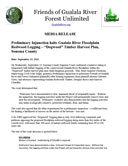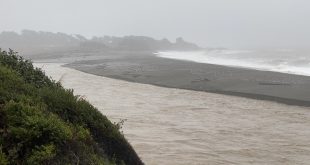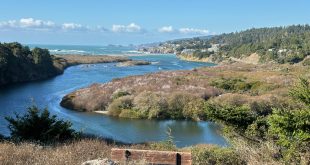Friends of Gualala River
Forest Unlimited
MEDIA RELEASE
Date: September 15, 2016 – updated

On Wednesday, September 14, Sonoma County Superior Court confirmed a tentative ruling to temporarily halt further logging of the controversial Gualala River floodplain within the “Dogwood” timber harvest plan area while litigation proceeds. Hon. René Auguste Chouteau, Supervising Civil Court Judge, granted a Preliminary Injunction to petitioners Friends of Gualala River and Forest Unlimited (plaintiffs) after hearing arguments from plaintiff attorney Edward Yates, and attorneys representing Gualala Redwoods Timber, Douglas Bosco and Ginevra Chandler.
The court determined that
“Petitioners have demonstrated a clear, imminent threat of irreparable injury. Without the injunction, the logging activities under the Project will permanently remove trees and alter the environment. Petitioners’ evidence also demonstrates that the logging activities may harm ecologically sensitive, protected wetlands, flora, and fauna.
The court also agreed that the other requirement for a preliminary injunction – a sufficient basis for finding a likelihood of success on the merits of the lawsuit – was met.
CAL FIRE approved the “Dogwood” logging plan in July 2016 following comments and petitions opposing the proposed floodplain redwood logging along more than five miles of the coastal river, with more than 300 acres of mature redwood stands containing trees 90 to 100 years old.
The text of the court decision is quoted below.
SCV-259216
Motion is Granted. Undertaking of $10,000 is required.
Petitioners have demonstrated a clear, imminent threat of irreparable injury. Without the injunction, the logging activities under the Project will permanently remove trees and alter the environment. Petitioners’ evidence also demonstrates that the logging activities may harm ecologically sensitive, protected wetlands, flora, and fauna.
The evidence provided also demonstrates some basis for finding a likelihood of success on the merits. Petitioners raise several arguments about the validity of the timber harvest plan (“THP”) which they claim were raised in the administrative proceedings. Petitioners’ evidence in their moving papers provide explanations about deficiencies in the THP while the portions of the THP to which both real party in its opposition and Petitioners in their reply cite further demonstrate possible defects which Petitioners raise and which were raised in the administrative proceedings. For example, real party’s opposition Ex.4, pages 202-209 appear to shows that the THP relied on only a generic list of plants that might be affected, as the basis for its findings, instead of demonstrating evidence of what plants are actually on the Project Site. Some of these pages are headed “common plant species list.” This failure to determine what plants are actually on the site, and thus likely to be affected, is clearly a potential violation of CEQA. Petitioners’ Ex.1 at 122-124, 130 demonstrates that a botanist expert on wetlands provided comments explaining how the Project may affect wetlands and the responses consisted solely of an assertion that two foresters walked the area and felt that no sensitive, protected wetlands were there but, as Petitioners argue, it is arguably not demonstrated that they were necessarily qualified to make such an assertion. The responses also state that real party is “confident” that it located all of the sensitive wetlands, an equivocal statement that arguably shows a lack of meaningful evidence.
Although Petitioners’ initial evidence may arguably be objectionable with respect to the merits of the action because not taken from the administrative record, this is not fatal to Petitioners’ motion and the court overrules any objection to the evidence on that basis. The court notes that at this time the record is not yet available and thus the parties should not be restricted to it while real party in its opposition, despite objecting to extra-record evidence, presents and relies on similar extra-record evidence itself. Moreover, the documents which are presented in the opposition and reply are ostensibly from the THP and thus clearly could be considered.
Finally, the balancing test and goal of preserving the status quo weigh in favor of the injunction due to the nature of the likely harms. Despite some weaknesses in Petitioners’ showing of a probability of success, the balancing test involves a mix of the two elements and the greater the showing on one element, the weaker it may be on the other. Butt v. State of Calif. (1992) 4 Cal.4th 668, 678. In contrast to the clear, and certainly irreparable nature of the harm which Petitioners raise, Real Party demonstrates no threat of irreparable injury that the injunction would cause, only a possible and temporary monetary injury to it. Real Party will merely suffer a delay in logging and if it ultimately prevails may still conduct the logging, obtaining the profits it would have obtained. Real Party claims that the injunction will threaten a sawmill which relies on the logs and that it will suffer $1.4 million in expenses, but this is not persuasive. Nothing shows that Real Party owns and operates the mill, the relationship between them being unclear at best. Even if Real Party owns the mill, the issue for threatened injury is not the lost profits, which again will be delayed only, but injuries that may result from going out of business due to a lag in production, which Real Party has not shown. Real Party also only asserts that it needs to proceed with the logging in order for the mill to operate at “full capacity” but this does not demonstrate that without this logging this mill could not operate adequately, at less than full capacity.
Because of the lack of evidence of injury resulting from the injunction, the court finds no support for the requested undertaking of $700,000. Due to Petitioners’ demonstrated lack of financial resources, and the unclear, tenuous nature of any material harm from the injunction, the court finds that an undertaking of $10,000 is appropriate.
For more information: www.gualalariver.org
Contacts:
Peter Baye, Friends of Gualala River, botanybaye@gmail.com, 415.310.5109
Rick Coates, Forest Unlimited, rcoates@sonic.net, 707.632.6070
Ed Yates, attorney, 415.990.4805
 Friends of Gualala River Protecting the Gualala River watershed and the species living within it
Friends of Gualala River Protecting the Gualala River watershed and the species living within it




